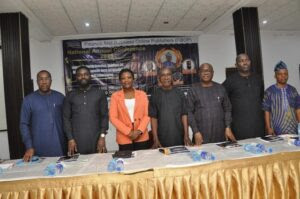
The executive vice chairman of the Nigerian Communication Commission (NCC), Dr. Aminu Maida has said that for the country to reach the $1 trillion economy by 2030, it needs resilient network systems that can bend without breaking, recover quickly from shocks and keep the nation connected even in times of crisis.
Maida made the declaration at the 2025 annual conference of Finance and Business Online Publishers (FIBOP) held at the weekend in Lagos under the theme ‘Leveraging technology innovations, tax reforms and opportunities in renewable energy and agriculture to achieve $1 trillion economy.’
Represented by the principal manager, projects, Mr Babatunde Apeji, the EVC who presented a paper entitled ‘Protecting Critical National Information Infrastructure (CNII) and Building Industry Resilience’ said the telecommunications sector “is the nervous system of our economy, without which financial inclusion, digital trade, governance, national security and e-commerce cannot thrive.
He stated that the sector contributed over 15% to Nigeria’s GDP, according to the National Bureau of Statistics (NBS) Q2 2025 report.
However, he said telecommunications infrastructure needs to be protected. According to him, the telecommunication system is under constant threat, with over 26,000 fibre cuts, vandalism incidents and theft cases recorded across operators between January and August 2025.
Maida, therefore, made a case for the protection of telecommunication infrastructure from cyber intrusions and ransomware attacks for “defending CNII is defending Nigeria’s economy.”
However, he announced that the Commission had deliberately transitioned from protection to resilience through telecommunications disaster recovery and business continuity guidelines by establishing a framework for preparedness, mutual aid agreements, rapid service restoration, and consumer education during emergencies; cybersecurity and incident response through its Sectoral Computer Security Incident Response Team (CSIRT) and the soon-to-be-launched Cybersecurity Framework for the Telecom Industry as well as building a frontline defence that can anticipate, detect, and contain threats.
The other measures include the Commission’s major network outage portal that ensures operators report significant disruptions, while consumers are kept informed and compensated where necessary; stronger infrastructure standards; enhanced compliance checklists for Tower Companies (TowerCos), requiring robust site security, redundant power systems, and climate-resilient designs; mandatory solar backup, dual backhaul, and community partnerships to ensure connectivity is not lost in underserved areas.
Nevertheless, the EVC said the government has to prioritise CNII protection in national defence and infrastructure planning and also called on security agencies to treat telecom assets with the same urgency as oil pipelines or power grids.
In addition, he said industry operators must invest in redundancy and joint monitoring, moving beyond siloed approaches while communities and citizens should see telecom assets in their vicinity as lifelines, not targets by guarding them as they would their own homes.
“The NCC is committed to driving this economic vision for our country. But commitment must be matched with collaboration. Together—with government’s support, industry innovation, security vigilance, and community participation, we will secure Nigeria’s digital backbone, protect our national lifelines, and lay the foundation for sustainable growth. Together, we will secure Nigeria’s future—and deliver on the promise of a trillion-dollar economy,” Maida said.



